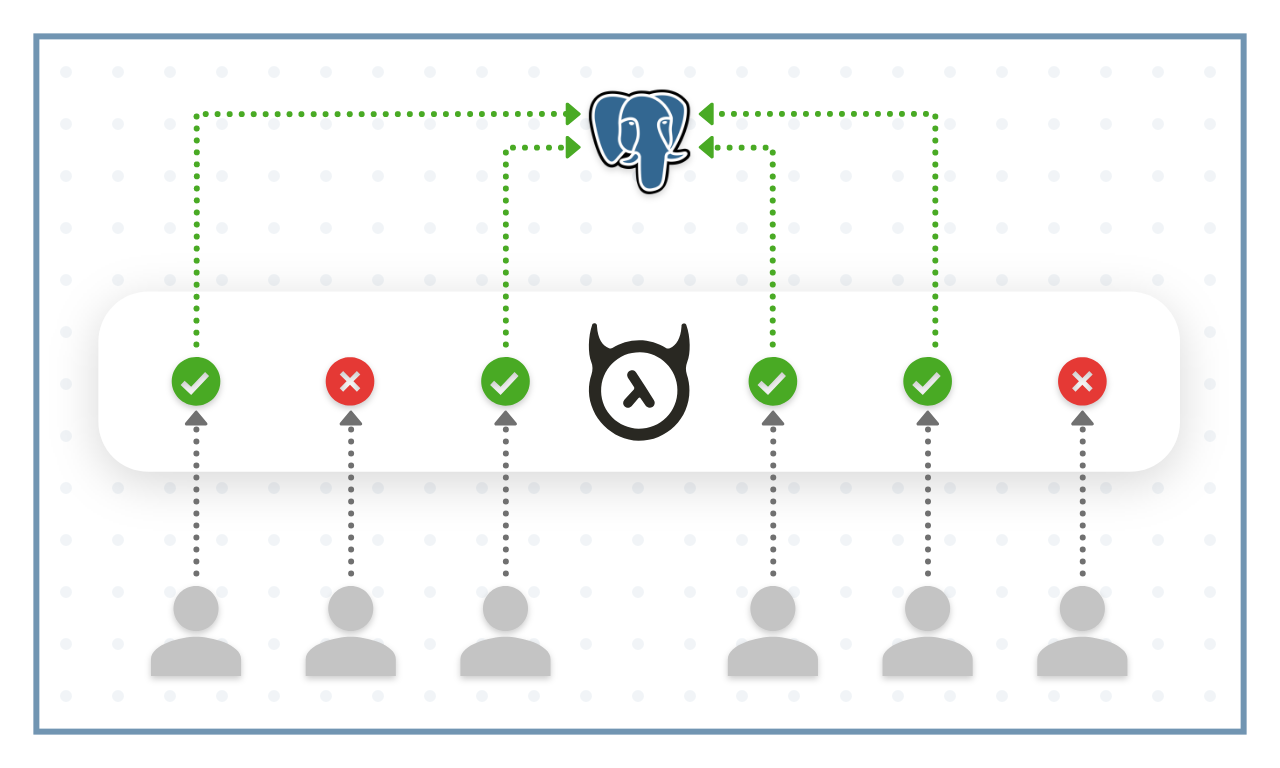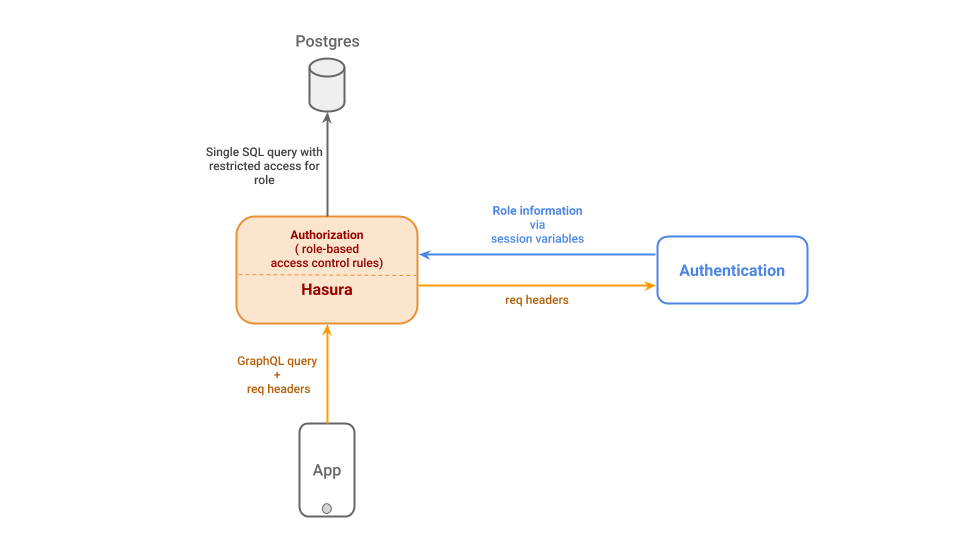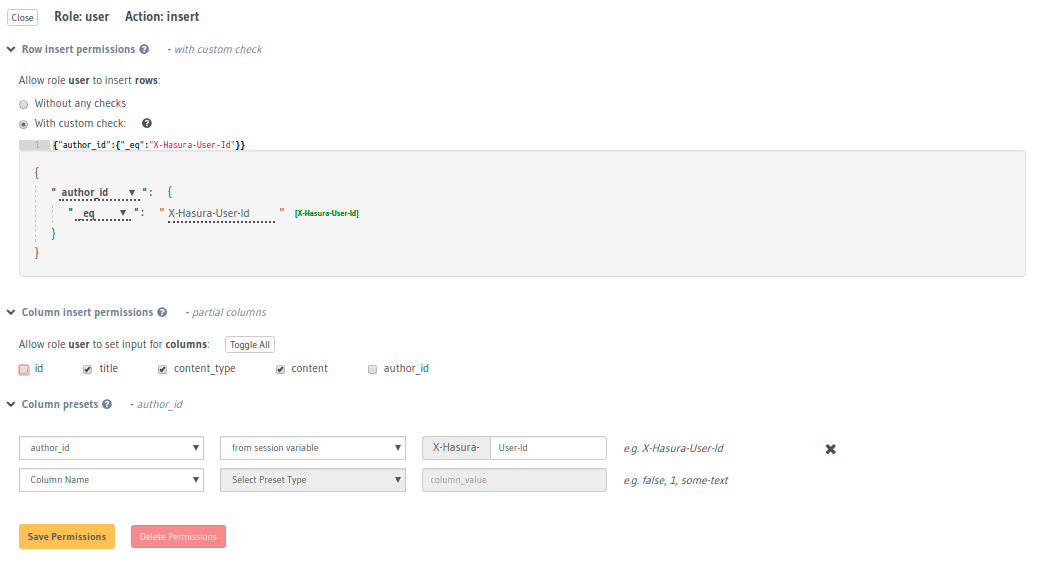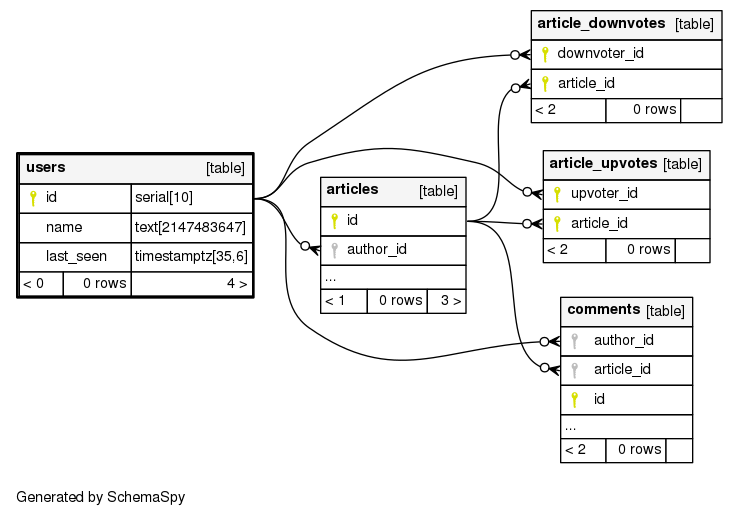Common access control patterns with Hasura GraphQL Engine

Introduction
Hasura GraphQL Engine
Hasura GraphQL Engine is a thin GraphQL server that sits on any Postgres database and allows you to CRUD the data with realtime GraphQL and access control.

Permissions

The roles in Hasura have nothing to do with the Postgres roles and users. These roles are implemented at the Hasura Layer.
-
Check constraint: This is a boolean value built out of session variables, values of the fields of the row being inserted and all the logical operators. For example, to insert intouserstable, you want to set a condition like{ "id": { "_eq": "x-hasura-user-id" } }. This condition enforces that whenever a row is being inserted to theuserstable, it can only be inserted if theidof the row is equal to thex-hasura-user-idvalue in the session variables. Columns: You can restrict insertion to only particular columns (rest of them being null, default or being inferred fromcolumn presets)Column Presets: Column presets are values that you can set to be assigned to fields while they are being inserted. For example, when an entry is being inserted in auserstable, we can take theidfromx-hasura-user-idsession variable. This helps to avoid parsing the session information on the client.
Filter: This is a boolean value built out of session variables and the values of the fields being selected. For example, in anarticlestable, you want all users to be allowed to query all published articles, but only their own unpublished articles. To implement that, you would add a filter like:
{
"or": [
{
"author_id": {
"_eq": "x-hasura-user-id"
}
},
{
"is_published": true
}
]
}Columns: Sometimes you want some roles to not have access to particular columns of the table. In such cases, you can explicitly choose which columns to allow and restrict.
Filter: This is a boolean value built out of session variables and the values of the fields being updated. For example, in anarticlestable, you want users to modify only their own articles. To do that, your update filter would look like:
{
"author_id": {
"_eq": "x-hasura-user-id"
}
}Columns: You can restrict which columns can be updated. This comes handy in cases when you do not wantcreated_atfield to ever be updated, but you might want to update thetitlefield in thearticlestable.Column presets: Like with insert, if you want to automatically update certain fields with certain values without it being explicitly mentioned in the request.
Filter: Like withupdate, the filter on delete permisson is a boolean condition which needs to be satisfied before the the row can be deleted.
Examples

query {
articles {
id
title
content
content_type
author {
id
name
}
comments {
body
id
author {
id
name
}
}
article_upvotes_aggregate {
aggregate {
count
}
}
article_downvotes_aggregate {
aggregate {
count
}
}
}
}- Through check constraint: In the insert permission of the
articlestable, you can set a check constraint like{ "author_id": { "_eq": "x-hasura-user-id" } }. This would ensure that the article would be inserted only if theauthor_idin the insert payload matches thex-hasura-user-idin the session variables. - Through column presets: In the insert permission of the
articlestable, you can disable inserting intoauthor_idcolumn and set a column preset such that theauthor_idis automatically taken from thex-hasura-user-idsession variable. In this way, theauthor_idwould be inserted appropriately without the client needing to explicitly mention it.
moderator: Should be allowed to updatetitleandcontentof without any filter.user: Should be allowed to update thetitleandcontentwith the filter{ "author_id": { "_eq": "x-hasura-user-id" } }.
moderator: Should be allowed to delete without checks.user: Should be allowed to delete with the filter{ "author_id": { "_eq": "x-hasura-user-id" } }
CREATE VIEW article_downvote_count as
SELECT article_id,
count(*) AS downvotes
FROM article_downvotes
GROUP BY article_id;{
"_and": [
{
"user" : {
"id": {
"_eq": "x-hasura-user-id"
}
}
},
{
"user": {
"karma": {
"_gte": 500
}
}
}
]
}- The user is inserting an entry as themselves (author_id is equal to
x-hasura-user-id) - The insert is successful only if the inserting user has karma greater than or eual to 500.
{
"_and": [
{
"user" : {
"id": {
"_eq": "x-hasura-user-id"
}
}
},
{
"content_type": {
"_in": ["text", "url"]
}
}
]
}- The user is allowed to insert only as themselves. (author_id is equal to
x-hasura-user-id) - In the article being inserted, the
content_typefield must be eithertextorurl.
Reference
Related reading




